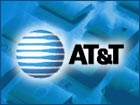|
AT&T undecided on broadband
|
 |
November 7, 2001: 1:01 p.m. ET
U.S.'s largest long distance company could still choose broadband IPO.
By Staff Writer Luisa Beltran
|
NEW YORK (CNNmoney) - AT&T Corp. has yet to decide whether it will sell its cable TV business or split it into a separate company for an initial public offering, CEO Michael Armstrong told CNNmoney.com Wednesday.
New York-based AT&T Corp. (T: down $0.01 to $16.14, Research, Estimates) reshuffled the management of its cable business last month, ousting Dan Somers as head of the broadband unit and replacing him with William Schleyer.
The change had led some to believe that AT&T would stick with its original plan to keep the cable business and float a tracking stock of the unit.
In July, AT&T Corp. rejected Comcast Corp.'s unsolicited $44.5 billion bid to acquire AT&T Broadband, as the cable operations are known.
Since then, AT&T has shopped the unit to various suitors, most notably AOL Time Warner, (AOL: down $0.19 to $34.96, Research, Estimates), parent of CNNmoney.com, as well as Cox Communications (COX: up $0.14 to $38.04, Research, Estimates). Comcast (CMCSK: up $0.61 to $37.76, Research, Estimates) in September revived talks between the companies when it agreed to sign a confidentiality agreement.
Armstrong, speaking at a JP Morgan telecom conference in New York, said AT&T would settle on a restructuring option for the broadband unit by the end of the year.
"We will choose whatever is best for shareholders," he said.
AT&T, the nation's largest long distance phone company, has told suitors to have their bids in by the end of November. Armstrong Wednesday declined to comment further on negotiations to sell the cable business.
However, when asked specifically by CNNmoney.com whether AT&T Corp. had decided whether to sell or float an IPO of the broadband unit, Armstrong replied: "We have not made up our minds," he said.
Last summer, AT&T pushed plans aside for an IPO of the broadband unit when Comcast Corp. made its unsolicited offer for the cable unit.
EchoStar-DirecTV merger
Separately, Armstrong said it will be tough for EchoStar (DISH: up $0.03 to $24.41, Research, Estimates) to gain regulatory approval. A Hughes-Echostar merger would combine the number-one and number-two cable satellite providers.
Last month, Littleton, Colo.-based EchoStar Communications beat out Rupert Murdoch's News Corp. to acquire Hughes Electronics (GMH: down $0.14 to $13.82, Research, Estimates), parent of DirecTV, for $26 billion in cash and stock.
An EchoStar-Hughes combination would create a dominant satellite company with 16.7 million subscribers. The merger also would create a direct competitor to AT&T Broadband, which is the nation's largest cable provider with 16 million subscribers.
EchoStar CEO Charlie Ergen has long maintained that cable TV is also a viable competitor in the market. If government regulators acknowledge that cable also is a player, the EchoStar-DirecTV merger could get approved, Armstrong said.
However, Armstrong hopes that the negotiation process consumes EchoStar. "As a competitor, I hope they get tied up in a lot of meetings," he said. 
|
|
|
|
|
|

|

